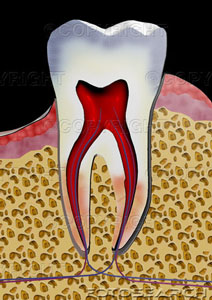A constant supply of calcium is necessary throughout our lifetime, but is especially important during phases of growth, pregnancy, and lactation (breast feeding). About 10-40% of dietary calcium is absorbed in the small intestine with the help of vitamin D. The level of calcium absorption from dietary sources drops to 7 in post-menopausal women. The body will absorb more calcium if there is a deficiency.

Factors that improve calcium absorption include adequate amounts of protein, magnesium, phosphorous, and vitamin D. Conditions that reduce calcium absorption include high or excessive intakes of oxalates and phytates, found in foods such as spinach and unleavened whole wheat products. Consumption of alcohol, coffee, sugar, or medications such as diuretics, tetracycline, aluminum containing antacids, or stress can reduce absorption of calcium. Lack of exercise can reduce calcium absorption as well as cause an increase in calcium losses. These life habits can immobility lead to calcium deficiency. Calcium deficiency can increase risk of bone disorders such as osteoporosis.

Calcium Functions
#Calcium is responsible for construction, formation and maintenance of bone and teeth. This function helps reduce the occurrence of osteoporosis.
#Calcium is a vital component in blood clotting systems and also helps in wound healing.
#Calcium helps to control blood pressure, nerve transmission, and release of neurotransmitters.
#Calcium is an essential component in the production of enzymes and hormones that regulate digestion, energy, and fat metabolism.
#Calcium helps to transport ions (electrically charged particles) across the membrane.
#Calcium is essential for muscle contraction.
#Calcium assists in maintaining all cells and connective tissues in the body.
#Calcium may be helpful to reduce the incidence of premature heart disease, especially if adequate intakes of magnesium are also maintained.
#Calcium may help to prevent periodontal disease (gum disease).
#Calcium Deficiency
#Calcium Deficiency in conjunction with high sodium intake is related to a higher risk of hypertension.
#Calcium Deficiency can lead to loss of calcium from the bone (initially from the jaw and the backbone), which can lead to deformity.
#Calcium Deficiency can cause extreme nerve sensitivity, muscle spasms, and leg cramps (called tetany) at very low levels in the blood.
Roles of calcium in human body





